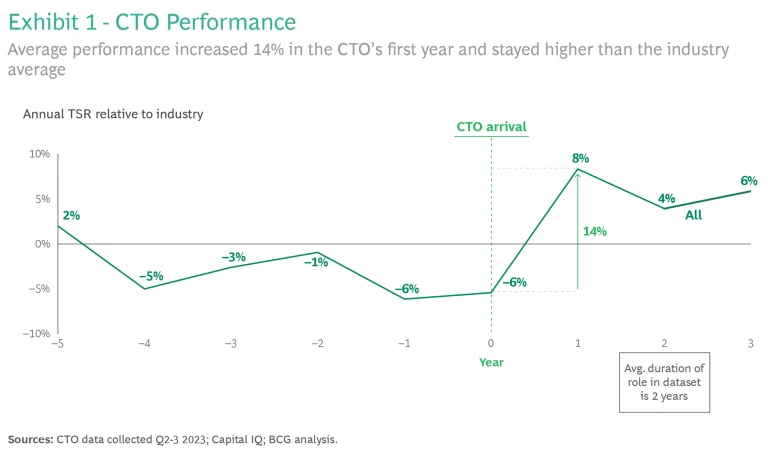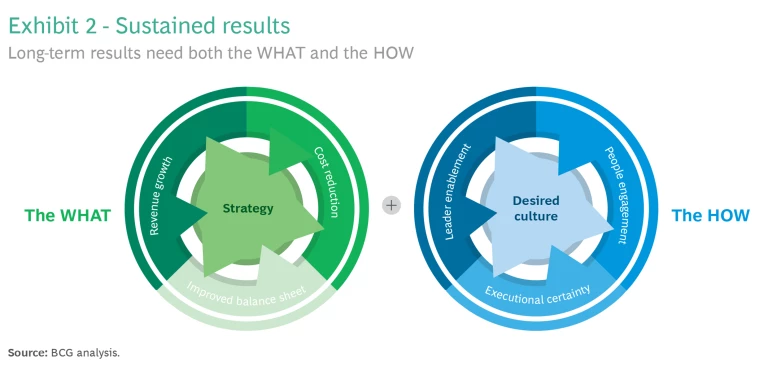Secular change is forcing many companies to transform.
The pace of competitive and technological change across industries is forcing many companies to undertake complex transformations involving strategy, business models, people, and processes. For example, generative AI is expected to grow into a $1.3 trillion market by 2032, up from $67 billion in 2023, and companies are working hard to understand how to react.
Executing transformations in response to external changes such as generative AI , as well as internal company needs, is exceptionally difficult. Research from BCG’s Bruce Henderson Institute indicates that up to 75% of transformations fail to meet their goals. To spearhead transformations and to improve their odds of success, companies have increased their hiring of Chief Transformation Officers (CTOs) by over 140%.
But does hiring a CTO help to improve performance? Are there certain business conditions when a CTO is more (or less) important?
In fact, most companies’ performance rose significantly over a three-year period after the CTO’s hiring—outperforming each company’s industry—according to BCG’s study of 350 CTOs. And not only did hiring a CTO benefit underperforming companies, but also those already overperforming their industry. “Transformation” is not always a synonym for a “turnaround”, it can benefit companies in many situations.
CTO Hiring on Upswing, Delivering Strong Returns
We found that the number of companies hiring CTOs increased more than 140% between 2019-2021. There was an uptick across all industries, with consumer, industrial goods, and financial institutions hiring the most.
To gauge performance of these newly hired CTOs, we calculated Total Shareholder Return (TSR)—a metric that summarizes the total return to shareholders from stock price changes and dividend returns—from five years before the CTO was hired through three years afterward. We found that, on average, companies in our study went from underperforming to overperforming in their industries. More specifically, their performance rose from 6% below their industry average TSR at the time of the CTO hire to 8% above the industry average in the first year after the CTO arrived. Importantly, this outperformance continued in years two and three (see Exhibit 1).

The CTO Dividend
For a more nuanced understanding of the CTO’s impact, we split the companies in our study into two groups. In one group are companies that had underperformed their industry average TSR for the past three years and were looking to elevate their performance by hiring a CTO. We found that 60% fell into this group, which we call Reactive Transformations. The other 40%—a higher percentage than we initially expected—are companies already outperforming their industries and looking to maintain or improve their position relative to their peers. We call these Preemptive Transformations.
Among both groups, a CTO-led transformation yielded significantly increased shareholder value. [D1] Reactive Transformations reversed their underperformance dramatically, with TSR accelerating from -23% to +5% after three years. Among Preemptive Transformations, CTOs helped companies maintain an above-industry average of +9% TSR three years following their hire.
CTO-led transformation yielded significantly increased shareholder value.
Overall, we found that 70% of Reactive Transformations improved TSR and 60% of Preemptive Transformers sustained their above-industry performance—well above the 25% success rate for all CTO-led and non CTO-led transformations. Both underperforming and highly accomplished companies have good reason to launch CTO-led transformations.
How to Achieve These Results
While in future analyses we will explore the characteristics and drivers of successful transformations, some preliminary results from this study are intriguing. For example, when looking at successful CTOs we found no statistically significant correlation between positive TSR and whether they were an internal or external hire, which functional area they came from (HR, Finance, etc.), their level of education, or even whether they previously had been a CTO or part of a Transformation Office. Simply put, there is apparently no one specific background that makes a successful CTO.
We can say for certain, based on BCG’s experience supporting clients across many hundreds of transformations, that success requires being focused on the “WHAT” and the “HOW” (see Exhibit 2). The “WHAT” is the right strategy, sustainable revenue growth, cost reduction, and an improved balance sheet—this is what transformations typically focus on. But equally important is the “HOW”, which involves enabling leaders, engaging people, ensuring execution, and driving desired culture. Together these sustain transformations.

Yet simply hiring a CTO is no guarantee of success. CTOs need the right structure around them such as a Transformation Office, the right governance, support from the CEO and senior leadership, and clear metrics and KPIs.
Our next CTO research will explore what additional factors help ensure success of these critical transformations.











